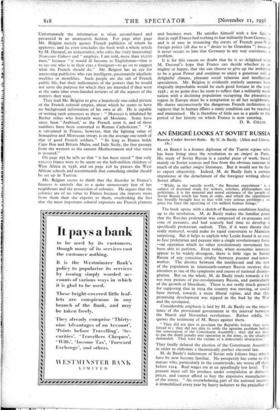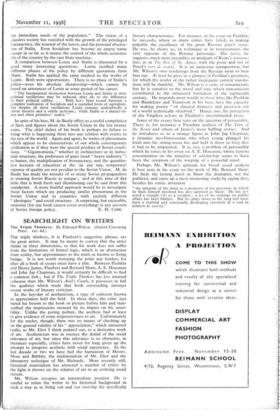AN EMIGRE LOOKS AT SOVIET RUSSIA
M. DE BASILY is a former diplomat of the Tsarist regime who has been living since the revolution as an émigré in Paris. His study of Soviet Russia is a careful piece of work, based mainly on Soviet sources and free from the obvious rancour of much of the earlier émigré literature. But it would not be fair
to expect objectivity. Indeed, M. de Basily feels a certain impatience at the detachment of the foreigner writing about Soviet affairs.
"While, in the outside world, 'the Russian experiment' is a subject of doctrinal study for writers, scholars, philosophers and politicians, it is the material and moral existence of the people of Soviet Russia which has been at stake, and which the experiment has brutally brought face to face with very serious problems ; its price has been the upsetting of 170 million human beings."
The book opens with a sketch of Russian conditions leading up to the revolution. M. de Basily makes the familiar point that the Russian proletariat was composed of ex-peasants and sons of peasants, and had scarcely had time to develop a specifically proletarian outlook. This, if it were theory that really mattered, would make its rapid conversion to Marxism surprising. But it helps to explain why Lenin found it so easy to fuse proletarian and peasant into a single revolutionary force —an operation which no other revolutionary movement has been able to perform. Even today, when economic interests appear to be widely divergent, there is little sign in Soviet Russia of any conscious rivalry between peasant and town- worker. The divorce between the intellecival and the rest of the population in nineteenth-century Russia receives due attention as one of the symptoms and causes of national disinte- gration. But on the whole, M. de Basily tends towards a far too rosy picture of pre-revolutionary Russia, and particularly of the growth of liberalism. There is not really much ground for supposing that in 1914 the country was moving, or could have moved, towards a more liberal regime, and that this promising development was nipped in the bud by the War and the revolution.
Considerable emphasis is laid by M. de Basily on the impo- tence of the provisional government in the interval between the March and November revolutions. Rather oddly, he quotes the testimony of M. Benes against them.
"They did not dare to proclaim the Republic before they were forced to ; they did not dare to settle the agrarian problem before the convocation .of the Constituent Assembly ; they did not dare to put the death penalty into operation in the army, as the situation demanded. They were the victims of.a democratic abstraction."
They fatally delayed the election of the Constituent Assembly in order to "elaborate a theoretically perfect electoral law.
M. de Basily's indictment of Soviet rule follows lines which have by now become familiar. No prosperity has come to the masses who, particularly in the countryside, are worse off than before 1914. Real wages are at an appallingly low level. The peasant must sell his produce Under compulsion at derisory prices, and cannot afford to buy the expensive manufactures of the towns. "An overwhelming. part of national income is immobilised every year by heavy industry to the prejudice Of
the immediate needs of the population." The vision of a classless society has vanished with the growth of the privileged bureaucracy, the renewal of the terror, and the personal absolut- ism of Stalin. Even Socialism has become an empty name except in so far as it means the control of the whole economic life of the country by the vast State machine.
A comparison between Lenin and Stalin is illustrated by a good many interesting quotations. Lenin justified many different phases of his policy by different quotations from Marx. Stalin has applied the same method to the works of Lenin. Both were opportunists. There is no phase of Stalin's policy—even his absolute dictatorship—which cannot be based on utterances of Lenin at some period of his career.
"The fundamental distinction between Lenin and Stalin in their political vacillations may be reduced, after all, to the difference in their political calibre. . . . Both havz been tossed between a complete realisation of Socialism and a curtailed form of capitalism. Yet despite all these vacillations Lenin remains undoubtedly a clever theorist and a subtle tactician ; while Stalin is a matter-of- fact and often primitive realist.'"
In spite of his bias, M. de Basily offers us a useful compilation of facts and figures about the Soviet Union in the last twenty years. The chief defect of his book is perhaps its failure to bring what is happening there into any relation with events in the rest of the world. Again and again, he writes of phenomena which appear to be characteristic of our whole contemporary civilisation as if they were the special product of Soviet condi- tions. " Gigantomania," whether in architecture or in indus- trial structure, the preference of guns (read "heavy industry ") to butter, the multiplication of bureaucracy, and the quantita- tive increase of education at the (at any rate, temporary) expense of quality are not peculiar to the Soviet Union. M. de Basily has made the mistake of so many Soviet propagandists in treating Soviet Russia as unique ; and at this time of day little that is both fresh and illuminating can be said from this standpoint. A more fruitful approach would be to investigate those factors which are producing similar phenomena in the Soviet Union and in countries with entirely different "ideologies "and social structure. A surprising, but excusable, omission (for one book cannot cover everything) is any account











































 Previous page
Previous page